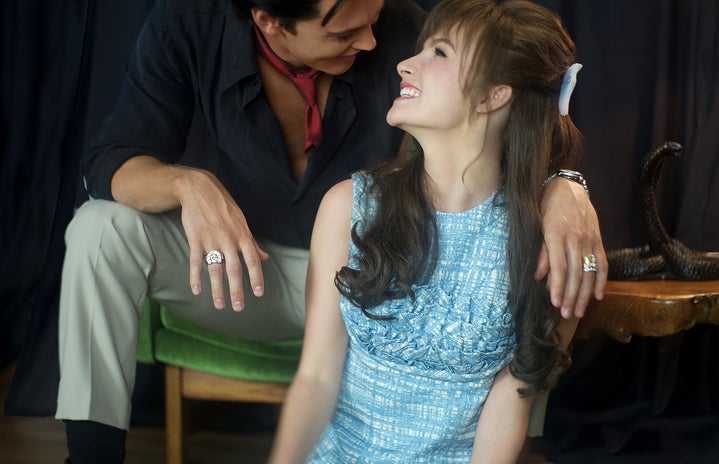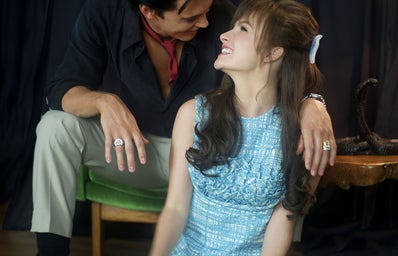As a lifelong Memphian, Elvis Presley has been a huge presence in my life. Growing up, I would listen to his songs in the back of the car, and my class would almost always go on a field trip to Graceland at some point. Restaurants even sell “Elvis sandwiches” (a peanut butter and banana sandwich) on their kids’ menus. In Memphis, Elvis is inescapable.
With the release of “Elvis” in 2022, a resurgence in Elvis hype occurred. Women across the nation fangirled and swooned in their movie theater chairs over Austin Butler, just as girls in the 1960s did with Elvis.
Despite his death in 1977, Elvis remains relevant in pop culture. Whether you love him or hate him, Elvis provided a lasting cultural impact on American society. He also revolutionized contemporary music as a whole. Through his combination of R&B, country, blues and gospel, Elvis was able to blend genres and create a new, authentic sound that was palatable to everyone.
However, it is also worth mentioning how Elvis got to his podium of fame in the first place. A lot of Elvis’s music was “borrowed” from Black musicians. For example, “You Ain’t Nothing But a Hound Dog” was originally a song from Big Mama Thorton, a prominent blues and R&B singer in the 1960s. Eventually, Thornton was able to obtain royalties for the song. Nonetheless, much of Elvis’s career relied on other songwriters making songs for him.
For example, “Blue Suede Shoes” is not an original Elvis song. It was originally written and sung by Carl Perkins, who was attached to the same production company as Elvis. However, when Elvis sang it on live television, everyone assumed it was his song. Eventually, it became a regular part of Elvis’s setlist. While Elvis shined in the limelight, Carl Perkins received little recognition for his work.
Even with Elvis’s notorious track record for “borrowing,” he has remained a consistent figure in pop culture. Prior to the release of “Elvis,” members of the Elvis Presley Fan Club were typically older women who had been fans in their youth. However, with the release of the Oscar-nominated biopic, fans have become more multigenerational. Both millennials and members of Gen-Z are listening to his music and learning more about Elvis, creating an Elvis renaissance. This resurgence in relevancy and popularity expands his impact even more.
Even with his recent biopic and popularity, Elvis’s dynasty has begun to slowly crumble. “Elvis” shows a very raw and vulnerable version of Elvis. While many felt sympathy for the exploitation Elvis endured, the film also portrayed the darker side of Elvis, showing his poor treatment of women, his tendency to steal music and his violent, heated outbursts. Many came out of the theater with mixed opinions. While some contend that Elvis is a victim, many have argued that his problematic behavior was unacceptable.
Personally, I came out of the film with mixed emotions. I felt a certain level of sympathy for Elvis, especially since he was exploited by both his manager and his family for money. The film also did an excellent job of portraying the impact of fame. Fame can seem glamorous, but the reality is it can be very suffocating to have all eyes on you and so many expectations placed on your shoulders. However, I did not come out of that film thinking that Elvis was a good person. It was clear from the beginning that Elvis prioritized his fame and success over anyone else in his personal life. His lust for fame caused him to lash out at others and refuse to take the blame for his actions. He was in love with the idea of being loved, making out with fans and inviting them to his home. He surrounded himself with people who would give him the attention and praise he wanted.
However, Sofia Cappola’s new biopic “Priscilla,” is the nail in the coffin for Elvis’s reputation.
For those who don’t know, Priscilla Presley was Elvis’s wife. The two met while Elvis was stationed in Germany for his military service. Priscilla was 14 at the time, and Elvis was 24. They met at a house party and started spending more and more time together until they eventually started dating. When Elvis returned to the States, the two continued their relationship with phone calls and occasional visits. When Priscilla was 17, she moved to Memphis permanently to finish her education and be with Elvis. Her parents also accompanied her on the journey. The two married in Las Vegas in 1967 when Priscilla was 21 and Elvis was 32.
The couple was married for seven years before Priscilla decided to file for divorce. After multiple affairs and enduring verbal and physical abuse, Priscilla left Elvis, taking their only daughter, Lisa Marie Presley, with her. In her 1985 essay in People magazine, Priscilla said by leaving Elvis she “found Priscilla.”
The divorce was very amicable. The couple did not let lawyers get too involved, and they even walked out of the divorce proceeding hand-in-hand. When Priscilla was invited as a guest star to speak at ITV’s “Loose Women” in 2017, she stated, “I did not divorce him because I didn’t love him. He was the love of my life, truly. If anything, I left because I needed to find out what the world was like.”
Even after the divorce, Priscilla continues to speak very highly of Elvis. She has even committed herself to keeping his legacy alive at his residential Graceland, now a tourist attraction. Each year on August 15, the day that Elvis died, fans flock to Graceland to commemorate the singer and performer. In an interview with People magazine, Priscilla stressed her responsibility for hosting the event and honoring her late ex-husband’s life. She said, “Anything he wanted to do or wished to do in life, I try to get that to happen. It’s a big responsibility.”
A year after the release of “Elvis,” A24 released “Priscilla.” The film, directed by Sofia Coppola, highlights Priscilla’s perspective and what she had to endure during their relationship. The film is based on Priscilla’s autobiography, “Elvis and Me.” Coppola, the director of “The Virgin Suicides” and “Marie Antoinette,” wanted to portray Priscilla’s life and feelings accurately. In a discussion with NPR, Coppola said, “I felt like my role was just to explain her experience and always go through [Priscilla’s] point of view.”
Naturally, “Priscilla” digs in deep and exposes the more problematic aspects of Elvis and Priscilla’s relationship. For example, the film portrays Elvis’s temper and overall pride. In her book, Priscilla expressed that she felt that she had to walk on eggshells around Elvis. In an interview with People Magazine, Priscilla stated, “My life was his life. He had to be happy. We never disturbed him. My problems were secondary.” The movie simulates these emotions of fear and anxiety Priscilla felt throughout their relationship.
In “Elvis and Me,” Priscilla wrote, “Sometimes [Elvis] lashed out just to drive home a point. If he thought it would teach us a lesson, he’d blow some minor grievance out of all proportion, and even as he was yelling he might wink at someone nearby. Then, ten minutes later, he’d be fine, leaving us bewildered and emotionally depleted. There were also times he would leave us emotionally uplifted. He was truly a master at manipulating people.” Alongside his mood swings and unpredictable temper, Evlis would also encourage Priscilla to take pills to sleep and his treatment towards Priscilla caused her to develop an ulcer from stress.
With the release of “Priscilla,” many are being introduced to what some call “the darker side of Elvis.” Despite his status as “The King of Rock’n’Roll,” his empire of fame is slowly coming to an end. More and more people are realizing the problematic history and behavior Elvis exhibited during his lifetime. This new Priscilla revolution dismantles the once pristine image society had of him.
I hope that “Priscilla” will inspire others not only to learn more about Elvis but also to appreciate Priscilla’s contributions to pop culture as well. Priscilla was the “it-girl” for her time, with her sharp eyeliner and iconic beehive. In addition, much of Elvis’s success and emotional stability relied on Priscilla. His career would not have been complete without her. Their relationship also sparked many tabloid articles, which only gave Elvis more publicity. As Coppola said to NPR, “They were kind of the closest thing we had to royalty.”
This film marks the start of a new age, ending the Elvis hype and beckoning in a new era of Priscilla appreciation.


